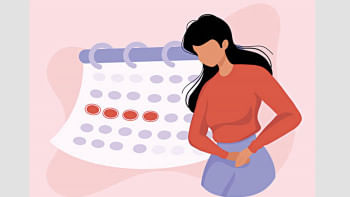Put a Period: How the youth is addressing menstrual equity

Menstrual equity entails people being aware of the importance of menstrual hygiene. It also requires every menstruator to have access to and be able to afford menstrual hygiene products like sanitary napkins and tampons. In developing countries like Bangladesh, where period poverty is highly prevalent, menstrual equity is still a reality we have to actively work towards.
A person suffering from period poverty faces the challenge of having limited access to menstrual hygiene products due to financial constraints. In Bangladesh, where the very word "period" is taboo, learning about periods can prove to be difficult. As a result, anecdotal education from their mothers and grandmothers is how many young girls learn about menstruation. In the majority of these cases, these anecdotes don't provide a comprehensive education and can lead to misinformation. The misinformation, in turn, causes poor menstrual hygiene and health complications that hinder daily activities.
With little done to address the lack of equity on fundamental levels, countless lives in underserved communities continue to be affected. Good news, however, comes in the form of young people who have recognised these disparities and the consequent need to bridge this gap.
Founded by four high schoolers from Viqarunnisa Noon School and College (VNSC), Put a Period is a non-profit organisation working to eliminate taboos surrounding menstruation. The organisation started in response to the discomfort and stigma surrounding menstruation, inspiring initiatives to combat menstrual inequity and period poverty.
Nahian Nawar, a recent graduate from S.F.X. Greenherald International School and an executive head at Put a Period, joined the organisation in 2020. She tells us that the aim of Put a Period is to make menstruation more equitable by sparking conversations about and around menstruation.
"We hold informative workshops in educational institutions and slums as a means to destigmatise periods for younger girls and impoverished menstruators," she says. "Our goal is to educate them about menstrual hygiene. However, we make an active effort to have engaging conversations with them instead of talking down to them. We strive to listen to individual experiences and incorporate them into these workshops. By creating an open and friendly environment, we try to let them know that periods are not something to be ashamed of."
In addition to dispelling common myths and covering the biological aspects of menstruation, Put a Period connects menstruators with healthcare experts. While not providing medical support, this initiative ensures that queries about menstrual health are properly addressed.

Farhat Fatiha Chowdhury, a graduate of Adamjee Cantonment College and another executive head, talks about the efforts of Put a Period to create a real-world impact through Project Ranga. She tells us, "In collaboration with Ella Pad, we have been distributing period kits to vulnerable menstruators in economically underprivileged areas like slums. Consisting of six reusable pads, free-size undergarments, soap, and informational pamphlets, these kits are designed to last around one to one and a half years."
Talking about the uniquely designed pads, she elaborates, "Made of scraps from garment factories means there is virtually no excess toll on the environment due to their production. Moreover, they can easily be washed and reused, making them much more economically sustainable than their one-time alternatives, particularly for those that can't afford the disposable pads and have to resort to using cloth napkins which have dangerous health implications."
Put a Period's commitment to the menstruating community is evident in their ongoing efforts to seek feedback and improve the kits based on user experiences. Incorporating said feedback into the product has allowed them to streamline these kits for maximum comfort and desirability.
One success story involves Bithi, a house helper from Bhashantek Bosti, who helped organise Project Ranga installations. When asked a couple of months afterwards if the initiative helped the community at Bhashantek, she talked about how those who received reusable pads felt more comfortable using them instead of clothes and also told their neighbours and friends about it. The community reached out to Bithi later, enthusiastically looking forward to the next distribution.
Their journey, however, has not always been easy. While trying to arrange workshops in religious institutions like madrasas, they had to take into account the layers of conservative barriers. Thus, they had to mould their workshops in a way so as to be mindful of their religious sentiments while also ensuring that Put a Period's goal of conveying proper, comprehensive information about menstruation was attained. They went through these extra hoops because they realised that though it is not easy to make everyone see their perspective, but it is still just as important to try.
While the work that organisations like Put a Period do is very appreciable, the adequacy and sustainability of these projects are important to bear in mind, given that most projects like this are youth-led and run on a small scale.
Nahian says, "With our limited funds and time, we can only reach so many people with our endeavours. We think government initiative is crucial to establish nationwide menstrual equity."
Areas in which period poverty is most prevalent, i.e. in economically disadvantaged communities, the lack of adequate wash and waste disposal facilities coupled with the absence of menstrual hygiene awareness are huge deterrents. Only by tackling these issues on a mass scale, through grassroots awareness and infrastructural development programs by government entities, can menstrual inequity and period poverty be eradicated.
References:
1. Period poverty: A silent crisis in Bangladesh. Madhuri Kibria, The Daily Star (August 19, 2023).
2. Menstruation: An overlooked challenge for underprivileged girls. Famiha Suhrawardy, The Dhaka Tribune (May 19, 2023)
3. Ella Pad: Eco-friendly sustainable sanitary napkins for women. The Business Standard (September 25, 2020)
Shanum Sarkar and Adrita Zaima Islam are A-Level students.

 For all latest news, follow The Daily Star's Google News channel.
For all latest news, follow The Daily Star's Google News channel. 










Comments